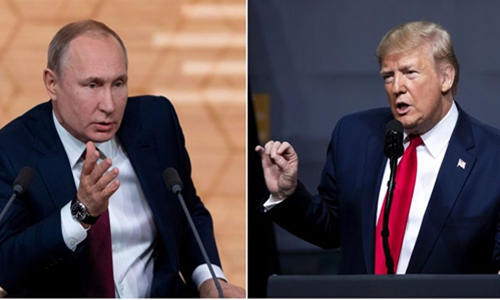US arms control negotiating tactics aim at consolidating military superiority
By Guo Xiaobing Source: Global Times Published: 2020/7/14 12:38:40

Xinhua file photos of Russian President Vladimir Putin and US President Donald Trump
The US has created quite a farce on world stage regarding arms control lately. During its nuclear arms control talks with Russia in Vienna in June, the US delegation put out non-standard Chinese flags on the negotiating tables.
Fu Cong, head of the Chinese Foreign Ministry's Department of Arms Control, said on July 8 that China would only be happy to participate in trilateral arms control negotiations with the US and Russia after the US cuts its nuclear arsenal to China's size. Despite this, the US did not give up and again invited China to talks on arms control on July 9. They distorted the message sent from the Chinese side by saying the US "welcomes China's commitment to engage in arms control negotiations… prudent next steps will need to include face-to-face meetings."
Why is the US persisting unreasonably? Perhaps the US' real intention is not getting China in the talks — but getting the US out of them.
The current Trump administration regards arms control as a crucial tool in the major power competition. It has made it clear that it wants to limit the development of nuclear forces in China and Russia.
To achieve the goal, it has played two cards. First, by tossing out a new arms control initiatives, it has advocated that Beijing should engage in relevant talks with Washington and Moscow. Second, by threatening China and Russia that if the two don't sign the deal demanded by the US, the latter will abandon the old deal and trigger a new arms race.
Yet the goal, the excuse, and the methods of US' first card are all absurd.
The objectives of US-initiated trilateral arms control talks are ambiguous. The US often argues that the US, Russia and China are the three major nuclear-weapon states. Yet the numbers of nuclear weapons in three countries are not at the same level. According to the Stockholm International Peace Research Institute, the US has 5,800 nuclear warheads. China only has 320. It can thus be argued that the current US administration has abandoned the concept of strategic stability and is seeking absolute competitive advantages in every aspect. What is the goal of trilateral arms control talks? The US government has not yet offered a clear answer.
This series of US accusations against China is extremely unprofessional. The US made accusations that China will quickly double its nuclear stockpile. This is utterly groundless. The Wall Street Journal reported in April that, "China might be secretly conducting nuclear tests" based on a "new arms-control report to be made public by the State Department." But the Wall Street Journal also acknowledged that the report did not present proof.
The present US way of promoting the trilateral arms control negotiation is also ridiculous. If the US sincerely hopes to realize realistic talks, it should create a good atmosphere for dialogues. Yet the US has been frequently showing off its military muscle by sending warships to South China Sea. The US is planning to deploy missiles to the Western Pacific and threatening to restart nuclear tests. Such logic is bizarre. Doing so will only worsen the security dilemma between Beijing and Washington. This will hardly help increase mutual trust or carry out relevant discussions.
So the real purpose of the US is to find an excuse to withdraw from the New Strategic Arms Reduction Treaty (New START) between the US and Russia in order to seek military superiority.
The US has already withdrawn from the Intermediate-Range Nuclear Forces Treaty (INF). It announced to withdraw from the 1992 Open Skies Treaty. It decided to drop out of the Arms Trade Treaty, a 2013 pact that regulates the international trade of conventional arms. The New START treaty, set to expire in February 2021, will likely become the next deal the US turns its back on.
To avoid being labeled as "killer of arms control deals," the US has tried hard to launch a war of words, confusing right and wrong, provoking ideological confrontation, and shaping a united front against China and Russia.
Such an approach will open up an era of chaos in international arms control. It won't bring peace and stability to the world. It will tear the international community apart, increasing the risk of international conflicts and even wars across the globe.
The author is director of Arms Control Studies Center, China Institutes of Contemporary International Relations. opinion@globaltimes.com.cn
Posted in: VIEWPOINT